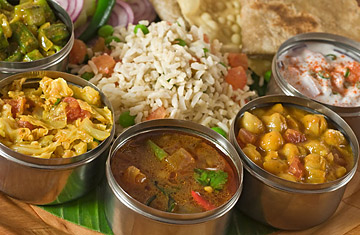
November 1 is World Vegan Day, a celebration of people who don’t eat meat. Or eggs. Or cheese. Or mayonnaise. Or honey. Or whey. Or gelatin. Or anything that comes from or includes an animal. Nor do they use any clothing, accessory or object made from an animal. No leather, no wool, no pearls, no ivory-keyed pianos. The animal-free holiday began in 1994, to commemorate the 50th anniversary of the Vegan Society.
Veganism is an extreme form of vegetarianism, and though the term was coined in 1944, the concept of flesh-avoidance can be traced back to ancient Indian and eastern Mediterranean societies. Vegetarianism is first mentioned by the Greek philosopher and mathematician Pythagoras of Samos around 500 BCE. In addition to his theorem about right triangles, Pythagoras promoted benevolence among all species, including humans. Followers of Buddhism, Hinduism, and Jainism also advocated vegetarianism, believing that humans should not inflict pain on other animals.
The meatless lifestyle never really caught on in the West, although it would sometimes pop up during health crazes and religious revivals. The Ephrata Cloister, a strict religious sect founded in 1732 in Pennsylvania, advocated vegetarianism — as well as celibacy. The 18th century utilitarian philosopher Jeremy Bentham believed that animal suffering was just as serious as human suffering, and likened the idea of human superiority to racism.
The first vegetarian society was formed in 1847 in England. Three years later, Rev. Sylvester Graham, the inventor of Graham crackers, co-founded the American Vegetarian Society. Graham was a Presbyterian minister and his followers, called Grahamites, obeyed his instructions for a virtuous life: vegetarianism, temperance, abstinence, and frequent bathing. In November 1944, a British woodworker named Donald Watson announced that because vegetarians ate dairy and eggs, he was going to create a new term called “vegan,” to describe people who did not. Tuberculosis had been found in 40% of Britain’s dairy cows the year before, and Watson used this to his advantage, claiming that it proved the vegan lifestyle protected people from tainted food. Three months after coining the term, he issued a formal explanation of the way the word should be pronounced: “Veegan, not Veejan,” he wrote in his new Vegan Society newsletter, which had 25 subscribers. By the time Watson died at age 95 in 2005, there were 250,000 self-identifying vegans in Britain and 2 million in the U.S. Moby, Woody Harrelson and Fiona Apple are vegans. So is Dennis Kucinich.
Strict veganism prohibits the use of animal product, even if it isn’t food, but like any lifestyle choice that ends in “-ism,” there are plenty of people who cheat. The vitamin B12 is found almost entirely in animal products, so many vegans eat fortified food or take a vitamin to get the right amount. And while American vegetarianism has broken free of its philosophical and religious roots, becoming an accepted health choice — many restaurants offer vegetarian options and most dinner party planners now ask “is anyone vegetarian?” before planning the menu — veganism is still tied to the animal-rights movement and is out there on the fringe.
Vegans can be as strict or lax as they want to be in their food choices: the International Vegetarian Union’s websiteincludes vegan-friendly reminders about baking pans greased with animal fat, grain cereals that include animal-based glycerin, and sugar refined with bone charcoal. Then there’s raw veganism, which is an offshoot of veganism in which none of the food can be cooked. Take that a step further and you get “mono meals,” the idea that the stomach should only digest one type of food at a time. Basically, if you eat it, there is probably someone else out there who won’t.
More Must-Reads from TIME
- Cybersecurity Experts Are Sounding the Alarm on DOGE
- Meet the 2025 Women of the Year
- The Harsh Truth About Disability Inclusion
- Why Do More Young Adults Have Cancer?
- Colman Domingo Leads With Radical Love
- How to Get Better at Doing Things Alone
- Michelle Zauner Stares Down the Darkness
Contact us at letters@time.com